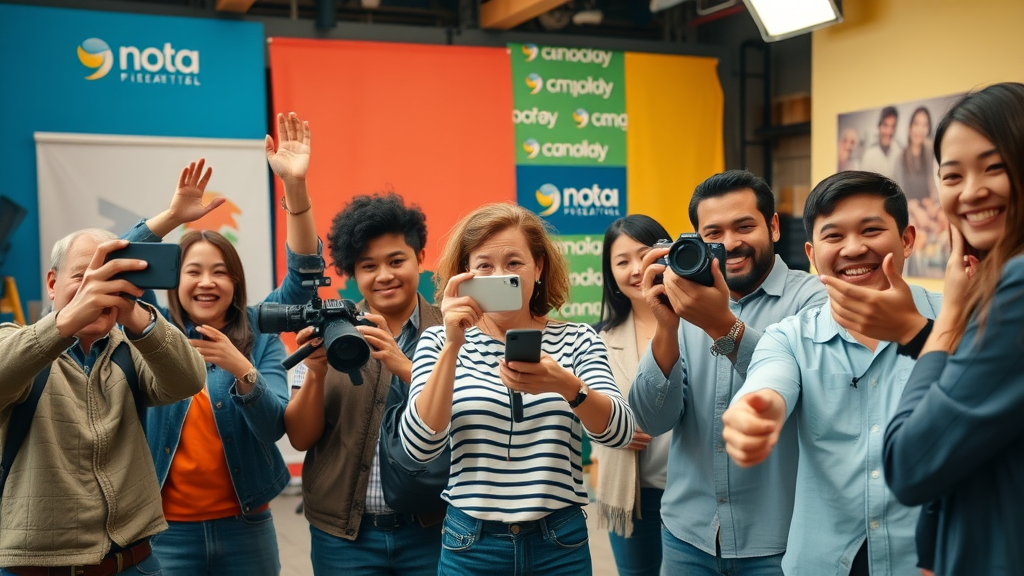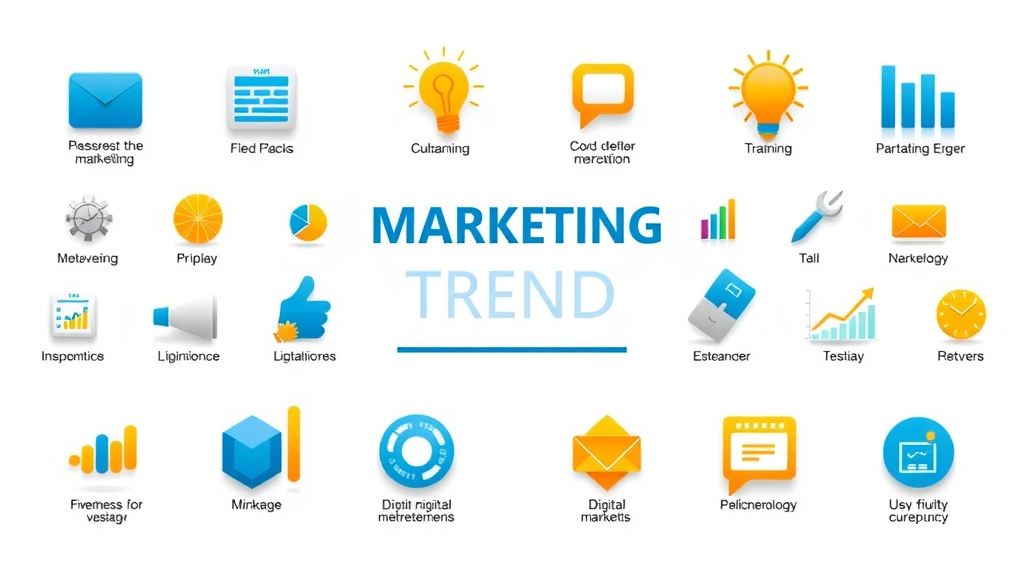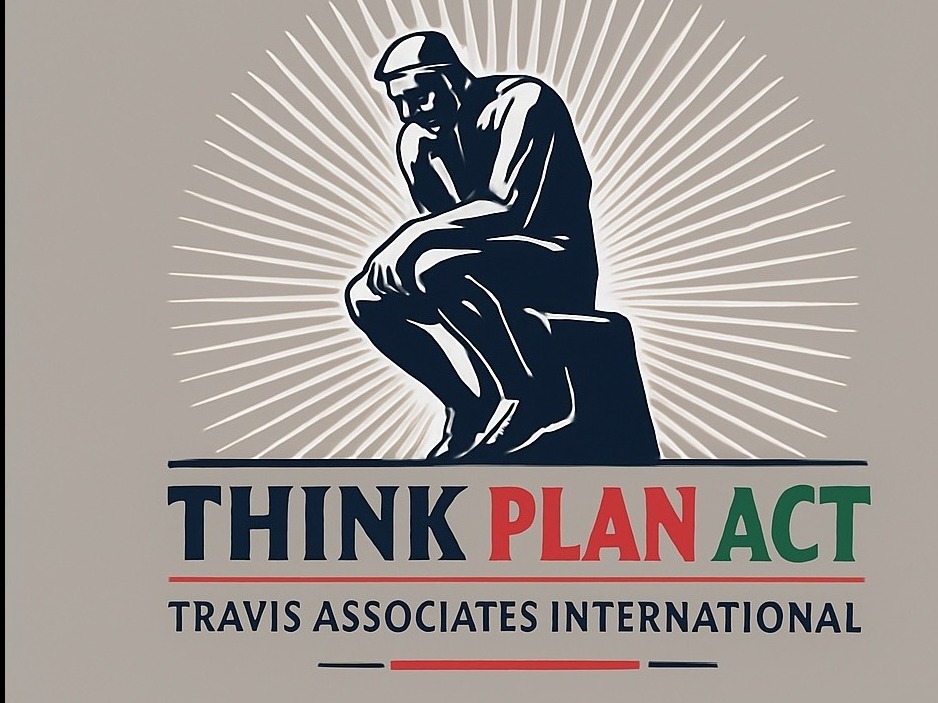Did you know? This year, businesses are expected to spend over $600 billion worldwide on digital advertising—a figure that highlights just how explosive and transformative digital marketing trends have become. If you want your marketing strategy to succeed and stay ahead of the competition, understanding these evolving digital marketing trends is crucial. Get ready to discover what’s driving change and how you can leverage these trends for growth and measurable results!
A New Era of Digital Marketing Trends: Surprising Numbers and Disruptive Changes
- An estimated $600 billion will be spent on digital advertising worldwide this year, highlighting the explosive growth and transformative impact of digital marketing trends.

The world of digital marketing is experiencing rapid and often unpredictable shifts. With a $600 billion projected global spend, it's clear that brands of all sizes must focus on innovative strategies to remain competitive. These trends aren’t just about adopting new technology—they’re about truly understanding the marketing trends that reshape how we engage with consumers. Today’s leading strategies are driven by remarkable shifts in consumer behavior , data analytics, and real-time engagement.
There’s no denying the influence of these top marketing tactics. In practical terms, companies are investing more in advanced AI tools and automation, while new platforms emerge at lightning speed. Whether it’s AI-driven personalization, immersive video content , or direct sales on social platforms , marketers who keep up with these digital marketing trends are positioned to achieve greater reach, relevance, and ROI.
Why Understanding Digital Marketing Trends is Essential for a Winning Marketing Strategy
"Brands ignoring digital marketing trends risk becoming obsolete." – Leading Industry Analyst
- Key motivations for following marketing trends
A successful marketing strategy relies on insight into current marketing trends . By keeping a close eye on what’s emerging, digital marketers can anticipate shifts in consumer behavior and adapt faster than their competitors. This approach isn’t about chasing buzzwords—it's about recognizing the forces that shape results in everything from campaign targeting to customer experience and brand loyalty.
Brands that monitor digital marketing trends consistently position themselves for competitive advantage . They’re able to craft messages that truly resonate with their target audience , leverage technology to amplify results, and respond swiftly to industry changes. Ignoring these trends can mean getting left behind, while the smartest brands use them as a blueprint for growth.
How Digital Marketing Trends Influence Every Marketing Strategy
Incorporating the latest marketing trend signals into your digital marketing plan elevates every aspect of your business. From new social media tactics to AI-powered customer segmentation, these innovations directly impact how brands achieve brand awareness , engage customers, and drive conversions. Each new wave of change influences planning, execution, and the metrics you use to gauge success.
For example, the rise of social commerce on popular social platforms allows brands to turn casual engagement into seamless shopping experiences. Meanwhile, techniques like voice search optimization reflect evolving user habits—shifting keyword strategies and content creation to better match real-world interactions. When adopted thoughtfully, these marketing trends empower businesses with adaptable, results-driven strategies.
Top Marketing Trends Reshaping the Digital Landscape
- Personalization at Scale with Artificial Intelligence
- The Rise of Video Content Across Social Platforms
- Voice Search Optimization Becomes Vital
- Innovative Social Commerce Solutions
- Authenticity and Brand Awareness through Influencer Marketing

The most influential digital marketing trends of the year reflect shifts in both technology and consumer expectations. Artificial intelligence is enabling hyper-personalized messaging, while omnipresent video content dominates social media feeds and branding efforts. Voice search is re-shaping search engine optimization , as mobile and smart devices transform how consumers look for products and services.
Additionally, breakthrough social commerce solutions make buying directly on social platforms the new norm, blending convenience and engagement. Influencer marketing remains a powerhouse strategy, with authentic voices building stronger connections between brands and audiences. Adapting to these trends is no longer optional—it’s the key to a high-impact, results-driven marketing strategy .
Artificial Intelligence: The Powerhouse Behind 2024 Digital Marketing Trends
No element is powering the current digital marketing trend landscape more than artificial intelligence . Brands use AI tools to automate content creation, enhance targeting, and optimize ad spending at unprecedented scale. As algorithms become more sophisticated, marketers enjoy new opportunities to create deeply personal, timely experiences for every customer.
AI is also fueling predictive analytics, proactive chatbots, and data-driven segmentation—making campaigns smarter and more efficient. Marketers who master AI not only boost their efficiency but also unlock insights that lead to better ROI and higher satisfaction across every digital touchpoint.
AI-Driven Personalization and Targeted Messaging
- Examples of AI in content generation, chatbots, and predictive analytics
"Artificial intelligence is the bedrock of the next generation of digital marketing."
AI-driven personalization is transforming how brands connect with their target audience . With advanced AI tools , marketers can generate dynamic content, deliver tailored recommendations, and predict user needs before they arise. Whether it’s using machine learning to write product descriptions, deploying intuitive chatbots for real-time support, or analyzing customer data for campaign optimization, AI is guiding every major marketing trend .
This shift empowers brands to create content that aligns perfectly with user intent and stage-of-journey. It's not just about reaching people—it's about reaching the right people with the right message, on the right channel, at exactly the right time. The resulting increase in engagement and conversions proves why AI-driven personalization is set to remain a leading digital marketing trend.
Generated Content & Automation: Streamlining Marketing Trends
Automation, paired with generated content , streamlines complex marketing campaigns and lifts productivity for digital marketers . Modern marketers use AI to automate repetitive tasks—like email segmentation, posting schedules, and ad rotations—so they can focus on creativity and strategic planning. From automating social posts to generating SEO-optimized blog articles, the capabilities are expanding quickly.
The impact? Quicker campaign launches, more accurate targeting, and significant cost savings. The scalability of automation allows even smaller brands to compete with larger competitors. As a result, embracing automation and generated content is quickly becoming a core aspect of leading digital marketing trends .

Video Content Dominates Social Platforms: Digital Marketing Trend Leaders
Video content is now the undisputed champion of social platforms . From short-form videos on Instagram Reels and YouTube Shorts to live streaming product launches, the rise of video has dramatically changed how brands communicate and engage audiences. Studies consistently show that video ads outperform static ones, driving higher engagement and conversion rates.
This marketing trend means that modern marketers must think visually and creatively. To maximize reach and impact, brands must incorporate both quick, snackable clips and longer, narrative-driven content into their digital strategy. From brand storytelling to instructional guides, video is now essential for standing out on crowded social feeds.
From Short-Form to Livestreaming: Trends in Video Marketing
- Why video content outperforms static ads
- Viral video content statistics for 2024

Why does video work so well? People process visuals faster than text, making video ads more memorable and shareable. Platforms like TikTok, Instagram Reels, and YouTube Shorts fuel viral marketing trends—statistically, users spend 88% more time on websites with video, and 59% of decision-makers prefer watching a video over reading text. These platforms’ algorithms favor video, doubling down on virality and reach.
Livestreaming also skyrockets brand awareness , with real-time engagement fostering genuine audience connections. In 2024, expect video content to continue evolving with interactive formats, shoppable streams, and immersive AR overlays that drive digital marketing innovation.
Brand awareness campaigns increasingly rely on dynamic video formats to humanize brands and build trust. Whether it’s customer testimonials filmed on smartphones or professionally animated explainer videos, marketing teams showcase stories that resonate with consumers—boosting both views and conversions.
By leveraging the emotional and narrative power of video, modern brands stand out in a busy digital landscape. Influencer takeovers, live Q&As, behind-the-scenes content, and even interactive video ads all play a part in creating authentic relationships and long-lasting brand loyalty.
Social Media and Social Commerce: Shifting Digital Marketing Trends on Social Platforms
Social media channels remain at the core of any digital marketing trend conversation. Today’s social platforms are far more than just news feeds—they’re full-fledged marketplaces where social commerce , peer-to-peer recommendations, and influencer partnerships drive revenue.
With consumer trust in traditional ads declining, marketers are shifting toward organic and community-driven engagement. As users share product experiences directly and platforms introduce more integrated shopping tools, brands must blend authenticity and convenience to win consumers.
New Marketing Strategies for Social Platforms
- Integrating personalized ads in social commerce
- User-generated content driving engagement

To thrive, brands need nimble marketing strategies for every major platform. This means joining conversations, harnessing trends, and creating content that encourages sharing and brand advocacy. Personalized ads play an important role in effective social commerce , ensuring recommended products match individual interests and browsing habits.
User-generated content is another game-changer: it not only amplifies trust but also drives engagement much higher than traditional promotional posts. By encouraging reviews, testimonials, or creative uses of a product, brands spark organic buzz that’s more credible and scalable than paid campaigns alone.
Influencer Marketing: Building Authenticity and Trust
"Influencers bridge the brand-consumer trust gap in ways traditional marketing can't."
Influencer marketing has become an essential tool in building authenticity and growing consumer trust. Unlike old-school endorsements, today’s influencers often have close, personal relationships with their audiences, lending brands a level of credibility that’s difficult to reproduce through conventional ads.
By carefully partnering with the right creators who align with brand values, companies can reach new, highly engaged communities. This approach strengthens brand awareness , especially among younger audiences on social media and emerging platforms where direct, unfiltered communication is the norm.
Voice Search: A Game-Changer for Search Engine Optimization
The explosion of smart speakers and mobile assistants has made voice search a critical focus for everyone interested in search engine optimization (SEO). Voice-powered queries now account for a significant portion of all searches—forcing marketers to rethink keyword strategies, targeting, and content structure for conversational, spoken queries.
This shift rewards brands that speak the same language as their audience—literally. Long-tail keywords, natural phrasing, and localization are more important than ever in climbing the search rankings via voice search on both smart devices and mobile platforms.
Optimizing for Voice Search: SEO and Digital Marketing Trends
- Natural language queries and long-tail keywords
- Localization and mobile optimization
| Traditional SEO | Voice Search Optimization |
|---|---|
| Focuses on short, typed keywords (e.g., “best sneakers”) | Focuses on conversational, long-tail queries (e.g., “What are the best sneakers for running?”) |
| Content structured in sections for readers | Content optimized for direct, spoken answers and featured snippets |
| Less emphasis on local search phrases | Prioritizes localization (“near me,” city names, local phrases) |
| Desktop-first optimization | Mobile-first and voice device optimization |

To win with voice search, marketers must prioritize conversational language and structure content for query-based answers. Ensuring your business is listed accurately in local directories, optimizing for mobile performance, and updating content to answer common questions will all help you ride this important digital marketing trend .
Emerging Technologies and Digital Marketing Trends to Watch
Tech continues to accelerate marketing trend innovation. Pioneering brands are already experimenting with the metaverse , AR/VR experiences, and immersive, data-rich environments that redefine what it means to engage audiences online. Early adopters are discovering entirely new ways to differentiate themselves, boost conversion rates, and elevate the customer journey.
Brands who leverage these early and experiment with futuristic solutions are finding faster and sometimes exponential growth returns. Whether through virtual showrooms, gamified ads, or augmented reality try-ons, these powerful tools represent the next growth horizon for ambitious brands.
The Metaverse, AR/VR, and Marketing Trend Transformation
- Early adoption case studies
- Future impact predictions

Case studies show that companies investing in AR/VR for product launches and interactive demos are recording measurable increases in both customer experience satisfaction and conversion rates. The metaverse is emerging as a mainstream shopping and engagement space, especially with younger demographics, highlighting a need for all brands to explore these digital frontiers.
Predictions for the next few years include even broader adoption, with brands hosting events, product launches, and interactive marketing campaigns in fully immersive, virtual environments. Staying aware of these developments will be essential for maintaining a digital marketing edge.
Data Privacy, Personalization, and Ethical Digital Marketing Trends
As personalization grows more sophisticated, so does consumer concern for privacy. Regulations around data handling, consent, and ethical use of personal information are evolving quickly—and marketers must adapt their strategies to build trust without sacrificing the advantages of new digital marketing trends .
Maintaining user trust means prioritizing transparent practices, secure data handling, and clear communication about what information is collected and why. The strongest brands balance the benefits of personalization with the need for integrity and compliance.
Balancing Personalization and User Consent
- Regulatory updates in 2024
- Best practices for ethical marketing strategy

2024’s regulatory landscape is changing fast for marketers. Laws like GDPR and CCPA set the baseline, but new regional regulations are appearing. Brands must adopt strict consent protocols and routinely update privacy policies to avoid costly penalties. Prioritizing first-party data over third-party data—and using it responsibly—embodies best-in-class ethical marketing practice.
The payoff? Consumers are more likely to engage with brands that value privacy and transparency. Proactively communicating how data is used, offering real choices about preferences, and honoring opt-outs are all vital steps to build loyalty and trust as part of your integrated digital marketing strategy .
Results-Driven Marketing Strategy: Applying Digital Marketing Trends
To realize the benefits of these emerging trends, marketing teams must focus on practical, action-oriented implementation. This means building a data-driven workflow that brings insight to life and measures performance at every step. Integrating AI tools , optimizing content for new platforms, and maintaining flexibility in campaign execution are non-negotiable pieces of the puzzle.
Every digital marketer should regularly assess campaign effectiveness and experiment with trending techniques, all while using transparent reporting to demonstrate ROI. The brands that succeed take a learning-driven approach—constantly analyzing, refining, and scaling up what works.
From Insight to Action: Digital Marketing Trend Implementation Roadmap
- Step-by-step worksheet for applying trends to your 2024 marketing strategy
Build your roadmap by starting with market research and identifying which digital marketing trends align with your business goals. Next, set KPIs, allocate resources for training and technology upgrades, and establish timelines for rollout. Use automation and AI to streamline repetitive tasks, and create an editorial calendar for consistent, trend-driven content delivery.
Don’t forget to gather feedback at every stage—from analytics dashboards to customer surveys. Use these insights to adjust tactics and double down on what’s most effective for your brand and industry.
Measuring ROI in Modern Digital Marketing
| Metric | Before Trends Implementation | After Trends Implementation |
|---|---|---|
| Lead Quality | Average | High (improved targeting and personalization) |
| Conversion Rate | 2% | 4% (with trend-driven content and AI automation) |
| Customer Engagement | Low-Moderate | Significant increase (video content, influencer marketing) |
| Brand Awareness | Steady | Notable growth (social commerce and multi-platform video) |
"If you can’t measure it, you can’t improve it." – Peter Drucker
Clearly, the most effective organizations use digital dashboards and analytics tools to capture, analyze, and act on real-time data. Setting up custom reports to compare performance before and after implementing marketing trends not only justifies investment but guides your team towards even greater success.

Want proof these trends work? From international giants to boutique businesses, forward-thinking brands are seeing huge wins by adopting AI, short-form video, shoppable posts, and influencer collaborations. These success stories showcase diverse industries—from retail to tech, healthcare to hospitality—all using trend-driven insights and tools to outperform the competition.
If you’re starting your own transformation, learning from brands that have “been there, done that” is one of the best ways to avoid pitfalls and capitalize on what really delivers ROI.
Frequently Asked Questions About Digital Marketing Trends
What is trending in digital marketing?
- Prominent digital marketing trends include AI personalization, interactive video content, voice search optimization, social commerce, and enhanced privacy measures.

What are the top 7 types of digital marketing?
- 1. Search Engine Optimization (SEO)
- 2. Pay-Per-Click Advertising (PPC)
- 3. Content Marketing
- 4. Social Media Marketing
- 5. Email Marketing
- 6. Influencer Marketing
- 7. Affiliate Marketing
What is the next big thing in digital marketing?
- The next big thing includes immersive technologies like metaverse marketing, hyper-personalization through AI, and AR-based brand experiences.
What are the 5 R's of digital marketing?
- 1. Relevance
- 2. Reach
- 3. Response
- 4. Relationship
- 5. Return on Investment (ROI)
Quick Reference: Digital Marketing Trends Calendar for This Year
| Month | Key Trend Focus | Milestone Event |
|---|---|---|
| January | AI Content & Personalization | Industry Trend Reports Released |
| February | Video Content Strategies | New Platform Algorithm Updates |
| March | Voice Search Optimization | SEO Conference Announcements |
| April | Social Commerce Enhancements | Major Platform Shopping Features |
| May | Influencer Campaign Scaling | Influencer Summit |
| June | Data Privacy & Ethics Updates | New Compliance Standards |
| July | AR/VR Product Launches | Virtual Expo Events |
| August | Brand Authenticity Campaigns | Community Engagement Drives |
| September | Customer Experience Innovation | UX Awards, Best Practice Sharing |
| October | Omnichannel Strategy | Cross-Platform Beta Rollouts |
| November | Holiday Shopping & Campaigns | Black Friday / Cyber Monday |
| December | Year-End Review & Planning | Trends Forecast for 2025 |
What You Need to Remember Before Shaping Your Marketing Strategy for 2024
- Adopt AI for personalization
- Maximize video and voice search trends
- Focus on data privacy and authentic brand interactions
- Continuously analyze ROI for agile marketing
"The only constant in digital marketing trends is change."

Need Help Adapting to the Latest Digital Marketing Trends?
- Let’s have a chat, call 908-641-9211
Take action: Embrace these trends, measure your success, and position your business for a future-proof marketing strategy in 2024!
To enhance your understanding of the latest digital marketing trends, consider exploring the following authoritative resources:
-
“Digital Marketing Trends For 2025 And Beyond” : This Forbes article delves into emerging trends such as voice search optimization, augmented reality, and hyper-personalization, providing insights on how these developments are shaping the future of digital marketing.
-
“The Future Of Digital Marketing: Trends To Watch In 2025” : Published by Forbes Agency Council, this piece discusses the rise of voice search, immersive marketing through AR and VR, and the importance of ethical data use, offering strategies for marketers to adapt to these changes.
By reviewing these articles, you’ll gain a comprehensive understanding of the evolving digital marketing landscape and how to effectively incorporate these trends into your strategy.
 Add Row
Add Row  Add
Add 




Write A Comment